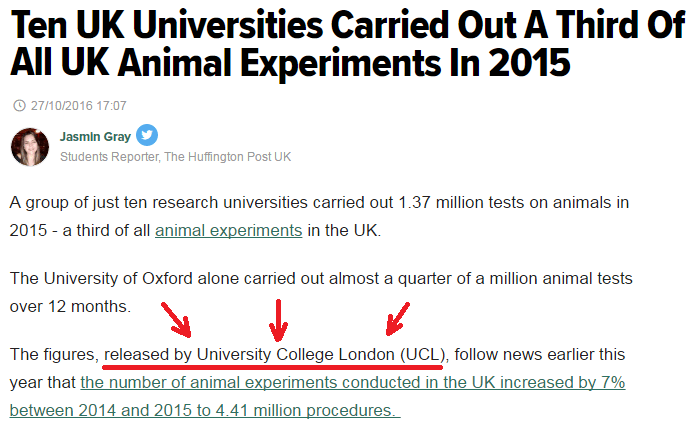Cruelty Free International (CFI), a British-based animal rights group (formerly known as the British Union for the Abolition of Vivisection), has produced its annual press release about animal research numbers at British Universities. The release, entitled: “Disappointing lack of progress at UK universities as worst offenders for animal testing are revealed”, is full of hyperbole, half-truths and even a few outright factual mistakes. The release is likely to leave those readers who have little prior knowledge of animal research, with a less accurate impression of what it entails than if they’d consulted the universities themselves. The full CFI release can be found at the bottom of this article.
The press release begins with
Cruelty Free International has today revealed the five worst offending universities for animal testing in the UK, which are each responsible for carrying out experiments on over 175,000 animals per year. The universities of Oxford, Edinburgh, Cambridge, University College and King’s College London, forced 997,839 animals to suffer in experiments in 2015. This represents a collective increase of 7% compared to 2014.
This might be more “revealing” if it wasn’t for the fact that these universities (and five more) came together six months earlier to proactively press release their 2015 animal research numbers. This release included nine case studies of research being done at the institutions in order to provide additional context to the numbers. The article was picked up by the Huffington Post (and a few other outlets).

The article included the number of procedures on animals carried out by each institution:
Perhaps CFI didn’t see it, you may ask? Well no, CFI’s Katy Taylor is quoted in the Huffington Post article, responding to the information provided by the Universities. Interestingly, CFI ends the first paragraph of its press release by noting that this represents a 7% rise by the top five universities over their 2014 statistics. This rise is exactly in line with the 7% rise in animal experiments that happened across all institutions in the UK (on average).
Cruelty Free International goes on to provide a table of the numbers (which they erroneously describe as “number of animals” when they mean “number of procedures” – a rookie mistake for an organisation which claims to be an authority on the issue). It notes the rise in the number of procedures at four out of the five universities, but describes the (very small) decline in numbers at the University of Oxford as “virtually no change”. That probably sounded better for their release. CFI also gets the number of procedures at the University of Cambridge wrong – it is 181,080, a number which is freely available on the university website.
The five universities mentioned also appear together in another list – they account for five of the top six British Universities on the QS World University ranking. Perhaps what CFI describe as the “worst universities for animal experiments” are in fact some of the best universities in the world for biomedical research (all five are also in the top 50 world institutions for “biological sciences”) and for advancing human health.

CFI’s press release then goes on to make unverified claims about things going on at the five universities. Because CFI provides no evidence or paper references for the claims that, for example, monkeys were “deprived of food or water”, or were “restrained for hours”, it is impossible to speak to the veracity of these claims. However, similar claims by other animal rights groups have often been found to be either false or misleading.
Dr Katy Taylor, CFI’s Director of Science, who is quoted in the press release, suggests these universities should be leading in “replacing and reducing animal testing”. Setting aside the fact that these institutions do animal research, and very little animal testing (which is a term for safety tests, usually done by pharmaceutical companies and CROs, and require by law before potential new medicines can move into human trials), the truth is that these institutions are leading the way in both animal and non-animal methods. For instance, researchers at the University of Cambridge have won NC3Rs Prizes, for the Replacement, Refinement and Reduction of animals in research, in 2008, 2009, 2011 and 2013; Oliver Britton at the University of Oxford won the prize in 2014 for a computer model of cardiac electrophysiology; and Dr Anna Williams at the University of Edinburgh was highly commended in 2011 for her work on cell cultures which can reduce the number of mice needed to test MS treatments. King’s College London, meanwhile, has developed a number of animal alternatives, such as this artificial gill system which reduces the need to use fish, and University College London is the home of the Replacement of Animals in Research Conference alternatives conference. Just because an institution is doing great work Replacing and Reducing animal research, doesn’t mean overall numbers will come down – as this is influenced by many factors.
Finally we come to one of trickier claims. Katy Taylor goes on to say:
63% of the 65 universities that reported testing on animals in 2015 still do not publish their animal testing statistics online, despite claiming that they agree there should be more transparency.
It is worth noting that the Universities that do the most animal research DO publish their statistics online. A quick search found 22 institutions that definitely published their statistics – they accounted for 1,612,166 procedures, of the 1,977,928 procedures conducted by all universities and medical schools in 2015 (Table 11). So rather than saying 63% of universities do not publish their figures (remembering that some of these institutions may only do a few dozen procedures), it might be more meaningful to say that 81.5% of procedures are accounted for in the data published by universities. It is unclear where CFI’s figure of 1,920,171 animals comes from as it does not appear in the 2015 statistical report.
Taylor then goes on to attack the University of Bristol over its statistics:
Bristol University now stands alone as the only university experimenting on animals that still refuses to provide its figures on the grounds that it does not hold the information centrally, despite promising to update its record keeping.
The Freedom of Information Act sets limits on the time that institutions can be expected to spend answering any single FOI question. The Information Commissioner’s Office has agreed with the University of Bristol and has upheld their claim that the University would be unable to provide the information asked of it due to the excessive lengths of time it would take to collate. The institution is in the process of changing how this information is collated and has expressed its intention to proactively publish this in the future.
It is an open question as to why, six months after a press release from UK universities went the extra mile to inform the general public about how many animals were used for what purposes at these institutions, anyone would strip it of its context and case studies, add the word “revealed” and republish it alongside their own anti-animal research diatribe.
Given that Cruelty Free International regularly calls for greater transparency in animal research, surely they should be welcoming the work that top universities are doing to provide more information about the research they conduct – rather than using this information as the basis of a press release criticising such research. We must hope that journalists choose to report the accurate numbers and representative case studies of medical progress released by the universities, rather than the account of an organisation whose sole purpose is to end the use of animals in experiments.
James
————————————————
Press Release sent by Cruelty Free International
Disappointing lack of progress at UK universities as worst offenders for animal testing are revealed
Nearly 1 million animals tested at five worst universities for animal experiments
Cruelty Free International has today revealed the five worst offending universities for animal testing in the UK, which are each responsible for carrying out experiments on over 175,000 animals per year. The universities of Oxford, Edinburgh, Cambridge, University College and King’s College London, forced 997,839 animals to suffer in experiments in 2015 (the year for which the most recent figures are available). This represents a collective increase of 7% compared to 2014.
In 2015 the following numbers of animals were used by each of the top five universities:
-
Oxford University (226,214) – virtually no change on the previous year
-
Edinburgh University (212,695) – 6% increase
-
University College London (202,554) – 15% increase
-
Cambridge University (181,090) – 13% increase
-
King’s College London (175,296) – 6% increase






“The fiends. What are they (CFI) thinking?”
I know! They want to stop the use of animals in experiments, but aren’t even willing to forfeit the 25 years or so that have been granted to them thanks to animal research! Even more shocking, is that they continue to accept medical treatments that were discovered thanks to animal research! Furthermore, there are rumors floating around that their friends and families also take advantage of these incredible advances. Unbelievable! Hypocrites, the lot of them.
As for Gandhi… He never said what you’ve quoted above, although your attempts to manipulate (lie) are not wholly surprising. Ironically, the quotation you’ve provided is actually a fabrication of an actual statement by Gandhi, originally co-opted by some conservatives as evidence that he was “pro-gun”:
“Among the many misdeeds of the British rule in India, history will look upon the act depriving a whole nation of arms as the blackest.”
Again, not surprisingly, this quote was taken somewhat out of context by that group of people, in that “whole nation of arms” probably referred to a state military (as opposed to people with guns). The context of this latter point can be gleaned from other statements he has actually made on the topic. As just one example, another actual statement by Gandhi:
“A rifle this hand will never fire.”
In my opinion, neither of those statements can likely be used to support either position, pro-gun or anti-gun — it’s difficult to draw conclusions about someone’s true beliefs based on a few quotes, especially when trying to apply them to current events. Anyway, the other quote you incorporated into your anachronous mash-up comes from an actual statement made by Gandhi regarding his thoughts on the treatment of animals:
“The greatness of a nation and its moral progress can be judged by the way its animals are treated.”
Indeed, Gandhi’s beliefs about human’s role in protecting animals is well known. So, I grant you that he may very well have been against using animals for experimental purposes, and I fully support with his concern for animal well-being in general (as do most researchers working with animals). That is why there are multiple overlapping and hierarchical regulations in place to protect animal well-being, and these measures are of utmost importance to scientific inquiry. Let me point out, however, that he never used the term, vivisection, which again points out your dishonesty and that of other “animal rights” entities who clearly are not interested in a good faith discussion on the ethical issues surrounding the use of animals for research purposes. In fact, this reminds me of another (actual) Gandhi quotation:
“There’s no God higher than truth.”
If you really want to emulate Gandhi and bring his principles to bare in the context of animal research, please consider the above before spreading misinformation and misattribution far and wide. A bit of critical thinking about these issues wouldn’t hurt either. Cheers.
Reblogged this on Green Jihad.
“…the account of an organisation whose sole purpose is to end the use of animals in experiments.” The fiends. What are they (CFI) thinking? Similarly, that daft article, Ghandi: “Of all humanity’s dark crimes, vivisection is the blackest.” Another do-gooder.